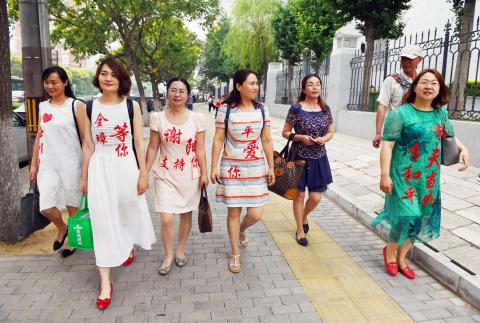Monitored, scared and made to feel like criminals, the women’s only offense is to be married to lawyers and activists detained by Chinese authorities, but a year after their husbands disappeared, they are defiant.
The men represented some of China’s most vulnerable people until they were held in a crackdown last year that swept up more than 200 attorneys and rights campaigners.
About a dozen are still being held in near total isolation and accused of subverting state power, which carries a maximum sentence of life in prison, while their spouses are subject to constant surveillance.

Photo: AFP
This week, five of them donned dresses emblazoned with their husbands’ names and marched to a national prosecutors’ office in Beijing — surrounded by dozens of police.
They clutched handwritten letters of complaint, accusing authorities in Tianjin — where all but one of the men are being held — of a litany of procedural errors.
The women emerged disappointed, still holding their letters, after officials refused to even read them.
Authorities “limit our freedom by stalking us,” said Wang Qiaoling (王峭嶺), whose husband, Li Heping (李和平), is among those held. “We have to creep around like criminals.”
A group of diplomats looked on, a sign of the concerns that the crackdown has sparked internationally. The EU and the US have called for the lawyers’ release.
Under Chinese President Xi Jinping (習近平), Beijing has tightened controls on civil society, and the 709 crackdown — named after the date of the first disappearance on July 9 — represents its largest-scale operation in years.
The UN High Commissioner for Human Rights described the detentions as “worrying,” but Beijing routinely dismisses such complaints as interference in its internal affairs.
The Chinese Communist Party has repeatedly pledged to implement the “rule of law,” but analysts said the crackdown shows the limits of that promise.
The nation’s courts are tightly controlled by the party, with forced confessions often used as evidence and guilty verdicts delivered in more than 99.9 percent of criminal cases.
Over the past decade a few hundred lawyers, sometimes with official encouragement, used the courts to seek redress — sometimes successfully — for what they considered egregious rights violations.
They include victims of forced demolitions, illegal “black jails,” dissidents jailed for their writing, and others detained for practicing religion.
Beijing law firm Fengrui, which has defended victims of sexual abuse, members of banned religious groups and dissident academics, was at the center of the 709 crackdown, with five of its staff still held.
The detainees have been denied access to their families or independent defense lawyers.
Li Wenzu (李文足), wife of Fengrui lawyer Wang Quanzhang (王全璋), said she had a security camera installed outside her front door and volunteers on constant watch outside.
“We are scared that if we plan to do anything together, they will detain us at home, so we leave home days in advance. We stay at hotels,” she said.
Officials from the Chinese Ministry of State Security two months ago attempted to persuade her to record a video imploring her husband to admit guilt.
She declined the offer.
State broadcaster China Central Television last year said the detained lawyers tricked clients and “created a nuisance” in court by arguing with officials, making recordings and taking photographs.
State media branded Fengrui a “criminal organization” whose staff had “staged open defiance inside the courtroom and on the Internet.”
Chen Guiqiu (陳桂秋) said she had been banned from leaving the country since her husband, Xie Yang (謝陽), was held.
“It’s the same for all of us. I was told it’s because of a threat to state security. I don’t understand how I can be a threat to state security,” she said.
The 709 detainees also include activists who organized protests outside courthouses.
Liu Ermin (劉二敏), whose 55-year-old husband, Zhai Yanmin (翟巖民), was held, said Beijing police beat her after she traveled to nearby Tianjin to try to locate him.
Fan Lili (樊麗麗) said her cash savings and bank cards had been confiscated after her activist husband, Gou Hongguo (勾洪國), was detained, and police pressured her landlord to force her and her newborn baby to move out of their apartment.
Police in Beijing and Tianjin did not respond to requests for comment from reporters.
Prosecutors are still considering whether to formally indict the men, their wives said. If they go ahead, the detainees are almost certain to be convicted and sentenced to lengthy prison terms.
“Now I’m always on the road,” Fan said, boarding a clattering subway train that took her toward her next, secret destination. “I never thought things could be this scary.”

LANDMARK CASE: ‘Every night we were dragged to US soldiers and sexually abused. Every week we were forced to undergo venereal disease tests,’ a victim said More than 100 South Korean women who were forced to work as prostitutes for US soldiers stationed in the country have filed a landmark lawsuit accusing Washington of abuse, their lawyers said yesterday. Historians and activists say tens of thousands of South Korean women worked for state-sanctioned brothels from the 1950s to 1980s, serving US troops stationed in country to protect the South from North Korea. In 2022, South Korea’s top court ruled that the government had illegally “established, managed and operated” such brothels for the US military, ordering it to pay about 120 plaintiffs compensation. Last week, 117 victims

China on Monday announced its first ever sanctions against an individual Japanese lawmaker, targeting China-born Hei Seki for “spreading fallacies” on issues such as Taiwan, Hong Kong and disputed islands, prompting a protest from Tokyo. Beijing has an ongoing spat with Tokyo over islands in the East China Sea claimed by both countries, and considers foreign criticism on sensitive political topics to be acts of interference. Seki, a naturalised Japanese citizen, “spread false information, colluded with Japanese anti-China forces, and wantonly attacked and smeared China”, foreign ministry spokesman Lin Jian told reporters on Monday. “For his own selfish interests, (Seki)

Argentine President Javier Milei on Sunday vowed to “accelerate” his libertarian reforms after a crushing defeat in Buenos Aires provincial elections. The 54-year-old economist has slashed public spending, dismissed tens of thousands of public employees and led a major deregulation drive since taking office in December 2023. He acknowledged his party’s “clear defeat” by the center-left Peronist movement in the elections to the legislature of Buenos Aires province, the country’s economic powerhouse. A deflated-sounding Milei admitted to unspecified “mistakes” which he vowed to “correct,” but said he would not be swayed “one millimeter” from his reform agenda. “We will deepen and accelerate it,” he

Japan yesterday heralded the coming-of-age of Japanese Prince Hisahito with an elaborate ceremony at the Imperial Palace, where a succession crisis is brewing. The nephew of Japanese Emperor Naruhito, Hisahito received a black silk-and-lacquer crown at the ceremony, which marks the beginning of his royal adult life. “Thank you very much for bestowing the crown today at the coming-of-age ceremony,” Hisahito said. “I will fulfill my duties, being aware of my responsibilities as an adult member of the imperial family.” Although the emperor has a daughter — Princess Aiko — the 23-year-old has been sidelined by the royal family’s male-only